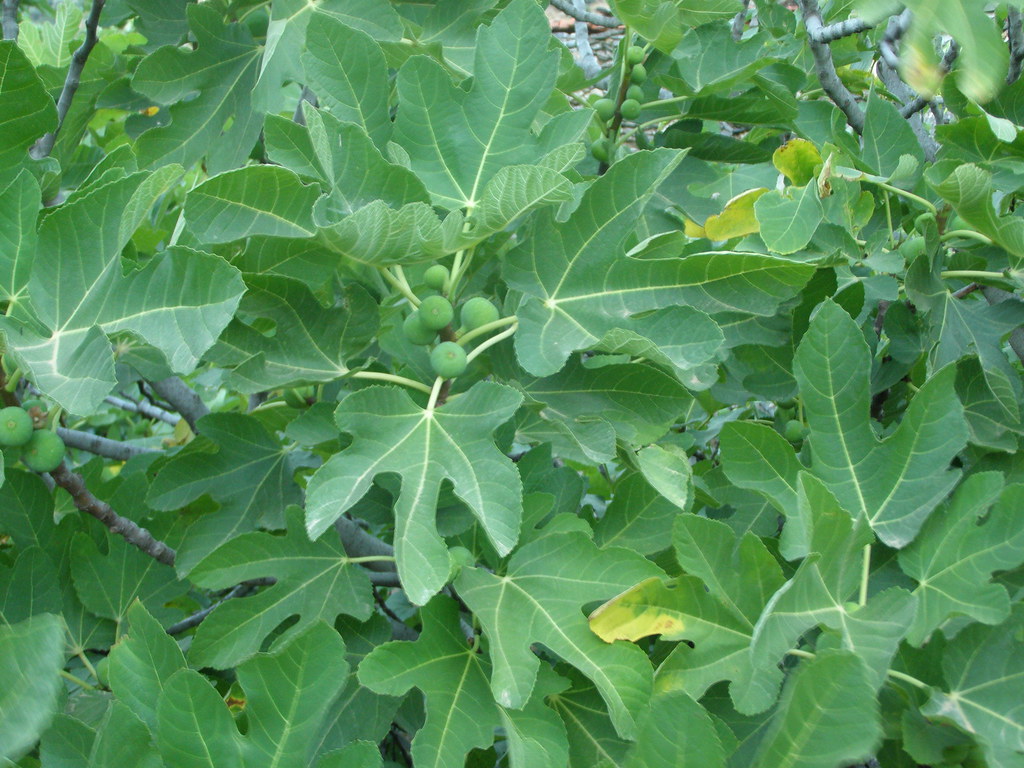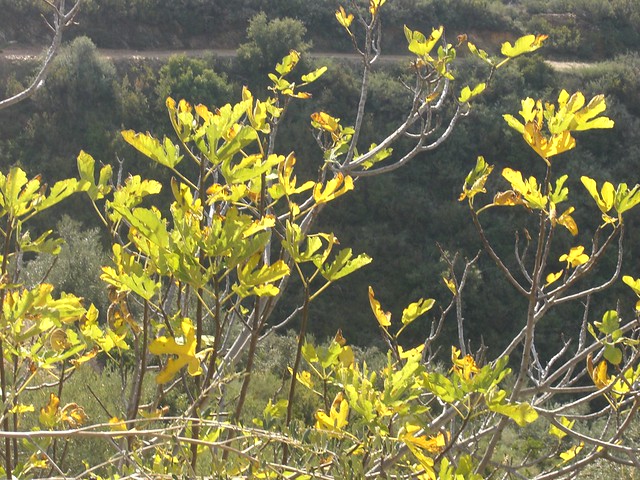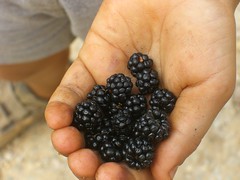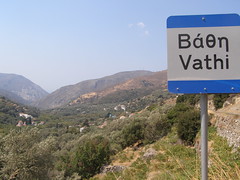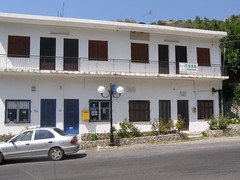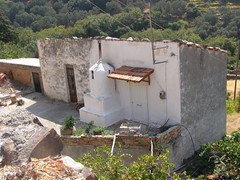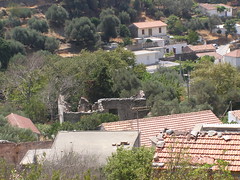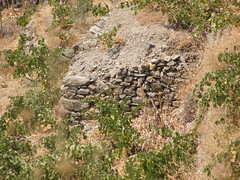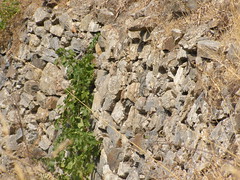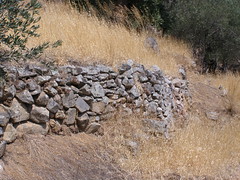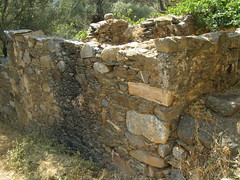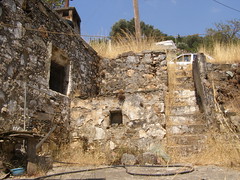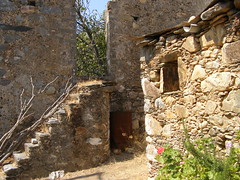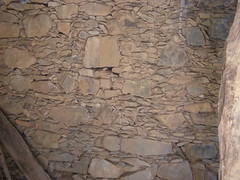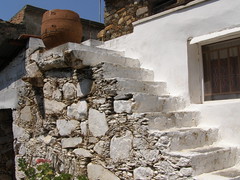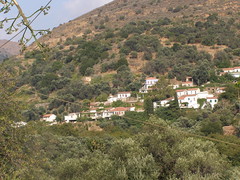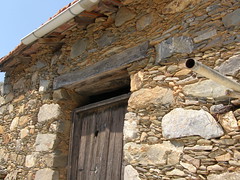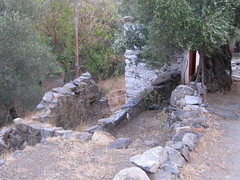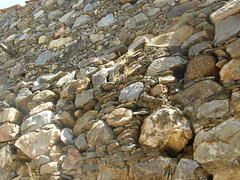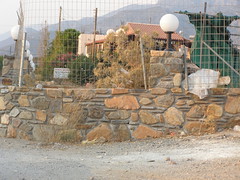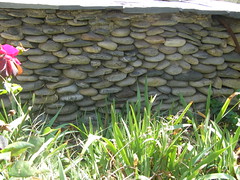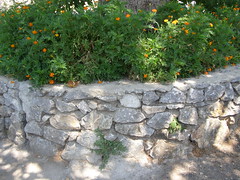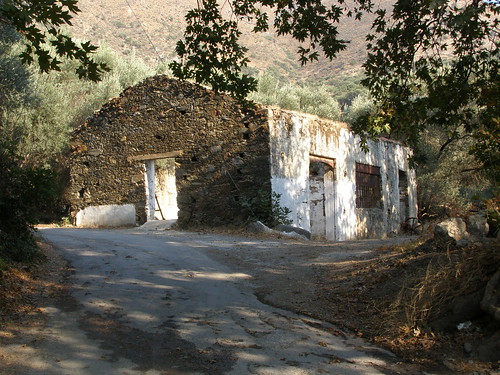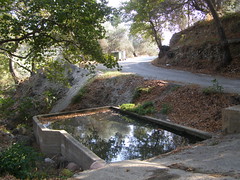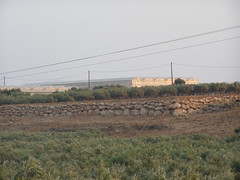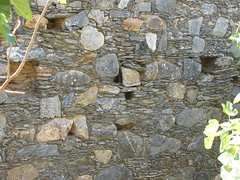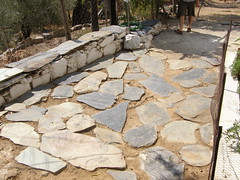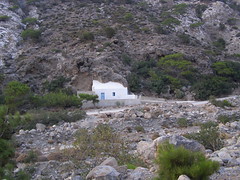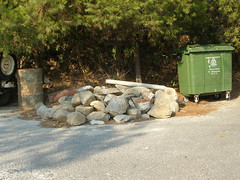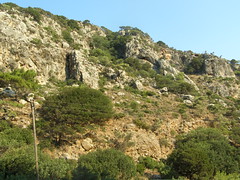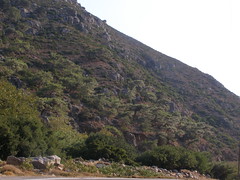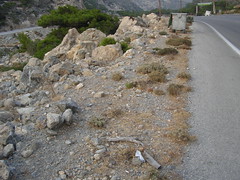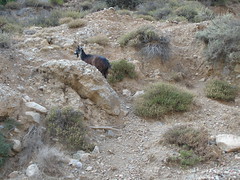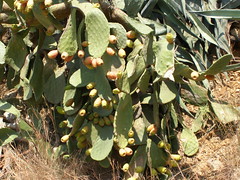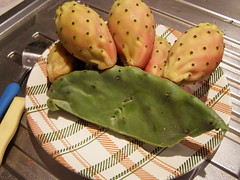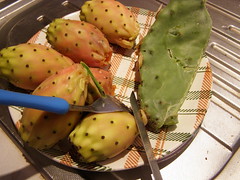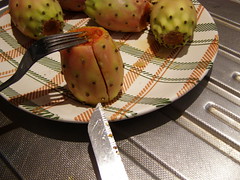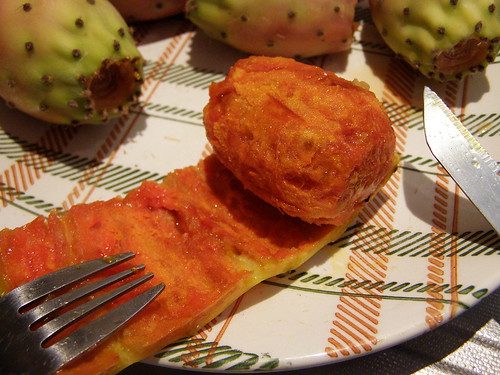On Holy Monday (Μεγάλη Δευτέρα), the church commemorates the cursing of the fig tree. It's a difficult story to understand: on the one hand, cursing is anti-social, no matter what the reason; on the other, the fig tree was barren, so it wasn't its fault that it had no fruit...
The olive grove was located only a few kilometres away from Babis' house, which sounded like a convenient arrangement: he could drive out to it any time he wanted with his family and when he wasn't able to tend to the needs of the trees or the field himself, he could send out one of the family members to check on them. This never happened. By the time everyone had come back home from work or school or after-hours activities, in between shopping, cooking meals, clearing the garden, tidying up the house, caring for the dog, cleaning up after the cat, and whatever else came up, they were all too tired to do anything other than have something to eat, help the children with their homework, clear the kitchen table and watch a bit of television before night fell and it was time to go to bed. Summer was worse - not only was it too hot to move; it was also too hot to stand still in one place, like in the middle of a field with the searing sun above one's head.
In any case, the olive grove was never easy to access. It was located on a hillside, and the ground below the olive trees was covered in low shrubs and thorny berry bushes. There were no water taps nearby; the olive trees were non-irrigated, just like Babis' father had been raising them before him. That was then, this is now: climate change had taken effect, and the yields were lower. If the trees did not receive some irrigation, then they would eventually dry up.
Babis used to pick the olives himself, but all the years of back-breaking work in the fields which he worked on in his 'free time' took their toll on his patience and stamina. Olive harvesting was very hard work. There were too many trees on the field for himself to tend on his own, and he only managed to keep three dozen or so cleared (from a field of 200 trees); in this way, the harvesting could be done quickly and easily by causal labourers, mainly Bulgarians and Albanians who were living in the neighbouring village. These people lived in rough accommodation provided by former residents of the village who had since gone up in the world, and moved to urban areas. They had left their πατρικά just as they had been when they had lived there with their parents, and were thrilled to be making money from their old properties by letting them out to desperate migrants, at what seemed like a low price - they were renting them room by room.
Babis was now feeling his age. He had reached the stage where he would only go to the village if his family would accompany him. They weren't the most helpful bunch, nor did they really want to drive out to 'Hokeypokeyville' as his wife called it, but he appreciated their 'moral support'. The children were difficult to entice away from the television, so he devised ways of keeping them busy at the village. He carried their beach buckets and spades and told them to dig holes in the earth so that they could plant new trees. This would be taking place while he kept himself busy on the field: trimming trees, coppicing, clearing land, eradicating wild grasses by uprooting them or cutting them right down to the soil level if the stems were too tough, gathering the scrubwood, piling it high to be burnt down, so that the land could be cleared.
As he conducted his jobs, he kept an eye and an ear out for the children. Even when he could hear them crying, he could discern from the sound of their cries whether they were arguing amongst themselves, or whether they were genuinely in trouble. When their cries were very loud, this meant they had the energy to cry hard: they were probably arguing. When they whimpered, he'd worry - that meant they didn't have the energy to cry hard, so they might be in trouble. Babis had only heard that sound once, when Makis had fallen three metres into a ditch. He came out unscathed, with only a few scratches. Babis considered himself lucky.
When the children got tired from digging holes in the soil (and they always did), he would then tell them to gather decomposed olives that had fallen off the tree and plant them in the soil. This was the children's favorite moment, but they always had a hard time understanding how something that htey just planted would grow without water. Once, Babis let them use the water he had brought with him to refresh themselves with, just for a little fun. The children ended up using it all. As if the dehydration wasn't enough, he had to put up with their whining that they were thirsty.
Babis' greatest fear was a wood-clearing fire getting out of control. He never lit fires in windy conditions, and he always checked that it had gone out before leaving the village. He had seen a close call once when his uncle phoned him and asked him what he had been up to. Babis had no idea what he was talking about. His uncle owned the land right beside Babis' field. He told him he'd come just before an olive tree caught fire. The embers had not gone out completely, and the heat had snaked its way across the field on the ground. Again, babis considered himself lucky, but he always wondered how long he would be lucky for. Surely, his luck would run out one day.
For this reason, going to the village had thus become something like a dreaded day trip, το αναγκάιο κακό, a whole day's outing which ended off with a tired sticky feeling, compensated by a few pats on the back, and exchanges of 'You worked well today' from other villagers who would pass by passing by the moment he was tending his fields. The truth was that everyone would have preferred to spend a lazy day at home, pottering around the house.
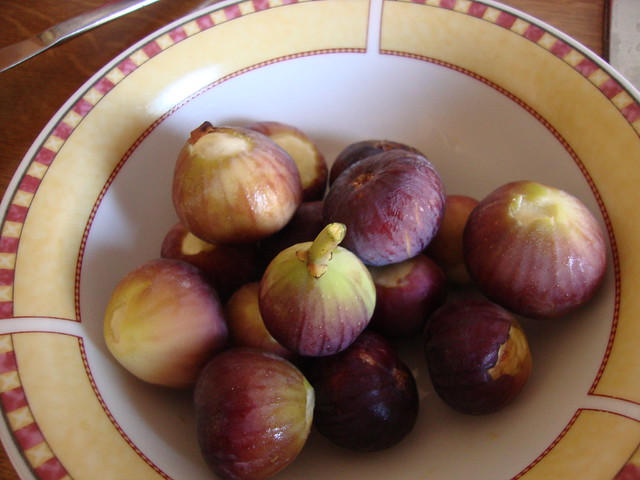
Early August is when the figs have just begun to ripen on the tree. By mid-August, they are at their finest, if the birds don't get to them before the humans, who aren't necessarily the rightful owners of the figs anyway. Babis had a couple of fig trees in the middle of the olive grove. In the past, it was highly unlikely that anyone would be trespassing on his field on a baking day in the middle of summer, but just lately, properties were springing up all over the place in the area. He could see little boxes dotted here and there in the surrounding fields. He dreamed of building a home of his own, where he would one day retire, but this was just pies in the sky for the time being.
All this activity in the area made him wonder who was strolling around unintentionally in his own territory. Few fields in the area were fenced off from the road, and it was easy for anyone to enter the property. There were not many things to steal or damage in the field, but if the 'passerby' chanced on a ripe fig or two, there would be nothing to stop him from taking more than that, without giving a thought to the owner, who would one day come to seek out this ambrosia for himself.
"Today," Babis announced over Saturday morning breakfast, 'we're going to the village to ---"
He had not finished his sentence before the children burst out with their objections.
"I've missed out on a million episodes of Sponge Bob because we're always going to the village on Saturday morning," cried Makis.
"Yayyyyy!" cried Toula.
"Tsittes," chirped Yanis, as he started crying.
"I haven't prepared anything for lunch," moaned his wife. Agapi knew she could just pick up a rotisserie chicken from the supermarket on the way to the village, but she still used the lunch excuse with the hope that it may catch on. She just wanted a couple of hours on her own in the house. She hardly ever had it to herself - it was only when Babis took the children to the village that she had the peace and quiet that all women dreamed of having every now and then, some time to themselves away from the responsibilities of caring for a family. When Babis took the children off her hands on the occasional Saturday morning, it was both a relief and a worry - she never really knew what they did up there while their father was busy with is mind on other things, so she always worried about their safety there.
"Let's just go for an hour or two to collect the figs, then we'll come back home," Babis insisted.

The arguments started as soon as the children got into the truck: whose turn was it to sit by the window? left or right window? who was going to sit in the middle? When they got to the field, Toula burst into tears as soon as she got out of the truck.
"What's wrong, honey?" Agapi asked.
"A cicada... a cicada... kissed me!" Toula said in between muffled cries. Then she heard Yanis screeching. In his rush to get out of the truck - he was sitting behind the driver's seat, but his father never allowed anyone to use his door to get in and out of the truck, hence Yanis was the last one off - he had fallen and scraped his knee cap.
The thorny wild blackberry buses were out of control again. Babis could never keep them in check. The earth had recently been dug up by bulldozers to freshen the paths leading in and out of the field. They had been cleared of grasses and rubble, so that now they were very soft and everyone's shoes shoes sunk into it. This had cost Babis a lot of money, but he felt it was worth it because it was a continuation of the work his grandfather had started and his father had nurtured. The only problem was that the fields were not bringing in any money. Their maintenance was eating into his savings.

The fig trees were in fine shape. Most of the fruit looked in good condition but only about half of it was ripe while half the ripe fruit had been pecked on by birds. The figs lay open, their contents spilling out like maggots. The field was located at a strategic point on a hill specially frequented by migrant birds. Beyond it, there were no more olive groves. The mountain turned into grazing ground for sheep and goats. A dirt track leading away from Babis' field was suitable only for driving with a 4x4.
To reach the fig trees, some of the overgrown branches from the olive trees as well as the thorny wild blackberry vines had to be cleared. In fact, this had to be done throughout the whole field. But Babis is one person, and the field fits about 5000 people on it. Babis used to take pride in doing this work, but as the family grew, it got harder and harder. He got out his clippers and chainsaw.
Agapi let the boys go off to play in the field. Their favorite game was to masquerade as cartoon heroes and act out scenes from their favorite shows. Toula stayed close to her mother. She liked playing with her brothers, but the countryside did something else to her whenever she found herself within its midst. She could spend hours in the field collecting flowers, grasses, twigs, stones, anything that caught her fancy. Agapi began collecting the figs on the outer branches of the tree and placing them in a plastic tray. Some were harder to reach than others. She carefully climbed down from the path to the lower terrace where Babis was trimming another fig tree.
"Toula, darling, you stay here," she warned her, 'it's a little steep." Without turning her head, she called out: "MAKIS!"
"Whaaaat???" Makis had stayed at the top of the field, refusing to trek down the steep hill. He was Buzz Lightyear, acting out scenes from Toy Story with Yanis, who was instructed to be Woody. They were each holding a stick and waving it in the air like a laser beam.





"Nothing!" Agapi answered absent-mindedly. She was simply checking on their whereabouts, as she couldn't see them from where she was standing. She bought out a plastic bag from her pocket and placed the plastic tray carefully into it. The figs couldn't be thrown into a bag altogether. Some were overripe and they would have become mushy if tossed one on top of another.
Before she knew it, Toula was standing beside her. "Honey!" she cried. "How did you manage to climb down, sweetie, weren't you afraid?" Toula was as light as a feather. Her little steps looked like skips, hops and jumps. She continued to make her way down to the terrace with the spirit of a light-footed sprite, without showing any signs of interest in her brothers' chimes.
"Buzz Lightyear to the rescue," Makis boomed across the valley.
"To infinity and beyond!" Yanis boomed back.
Toula was humming. She wasn't afraid of slipping, tripping and falling like her brothers. Babis thought of her as an exceptionally helpful offspring. "You should have been born a boy," he would often say to her. She would always ask him why that is. "You'll understand when you are older," he would reply to her. When he compared his boys to his little girl, he was glad to have gone through the trouble of having that third child. At first, he thought of that third pregnancy as a financial burden. When she was born, he was relieved that at least the 'mistake', as he had referred to her during Agapi's pregnancy, served its purpose, as he had secretly been hoping for a girl to compete his idea of a perfect family.
As the children grew and developed their own personalities, he realised that his little girl showed more of the qualities that he wanted to see in all his children than did his boys. Babis found it difficult to believe that none of his sons showed any love for the fields, the earth or the village of their grandparents. Toula was special in this respect. He now passed the clippers to her and told her to chop off all the small branches growing from the root of the tree. "But they're all baby fig tree," she said, with a maternal worry. He laughed and told her that they were not babies, and she really wouldn't be hurting them if she cut them off.
Agapi was still picking through the figs, choosing the ripe ones and placing them carefully in the bag. It was sticky dirty work. It was also easy to eat them as they were picked. She usually did this with the figs that the birds had pecked a hole through. On first look, they seemed bad, but once the fig was halved and opened, it was easy to see if it was infested with insects or it had rotted. But by then, it was too easy to pop it into her mouth by that time. It was one of life's greatest pleasures to taste a fig fresh on the field. When her hands could no longer bear the sticky mess, she decided to take a break.
"Let me just see what teh boys are up to," she called out to Babis, as an excuse to get away for a few minutes. She could hear them playing, so she didn't really need to walk up to where they were to see what they were doing, but she just wanted to get away from the dirt that was now coating her sticky fingers. She couldn't even wipe the sweat off her face or rub her tired dusty eyes, and there were still more ripe figs on that tree, even if some were infested with insects.
"Toula, here's the bag," she said, as she watched her little one picking figs off the tree and licking her fingers at the same time. "Do you want to stay here and fill it up, or would you like to come with me?"
"I'm staying with Baba," she replied. Toula was very much a daddy's girl. The two of them spent more quality hours together than Toula did with her mothe, even though it was with her mother that she actually spent more time with. Mother and daughter had a more parent-child relationship, whereas father and daughter were more like friends. Toula more often accompanied Babis to the fields when he couldn't take the strain of looking after three children altogether.
Toula, from her side, knew how to make her father's heart melt. She would sit at his feet while he was sitting in the armchair in front of the television, and slowly make her way into the wide hug of his arms, nestling into his lap. Then she'd pick up his fingers, one by one, and massage them. Just before she would drop off to sleep, she'd moan softly for a blanket, which Baba would fetch from the haphazardly folded pile sitting on the nestled tables next to the armchair and throw over both of them. Only when Agapi prodded his thigh (firmly) would he wake up and take himself and Toula to bed.
The boys never did this. Instead, they fought over who would get the bigger sofa and the bigger blanket. They were both getting tall too quickly. Just lately, Babis noticed that they were also getting fat.
Toula had picked all the ripe figs that she could find growing on the lower branches. She now tried to reach a ripe fig higher up on the tree. She began pulling the branches down so that she could put her little arm through them to reach her land up through them as far as she could. She had just grasped one of the figs when she let go with her other hand of the branch a ltittle too quickly. The fig snapped off the branch, as it wasn't that ripe. At the same moment, Toula lost her footing slightly and her right leg landed onto the bag full of figs sitting on the tray.
Babis heard the violent whip of the branches as they came returned to their upright position.
"TOULA!" He dropped what he was doing and raced back up the hill to see what had happened Toula had opened the bag to inspect the damage. Her father stared at the figs in a daze. He was livid. The figs looked more like marmalade than pieces of fruit.
"Βρε ζώον!". All he could think about was the precious fruit, and how they had just been squashed. All that work for nothing! Toula looked up, wondering what she had done that was so wrong. She was licking her fingers from sorting out the figs, whose oozing contents were now open to all.
"No, I'm not," she said firmly, as she often responded when her father said this to her. It was most often jokingly that he would call her an animal, when she spilt her milk or dirtied her clothes while she was eating. But this time, his voice had a different ring to it He wasn't making fun of her; he sounded angry.
"OK, you're not an animal, ηλίθιο κατασκεύασμα," he said.
She remained silent, keeping a straight face throughout the scene, while all the time, she looked at her father's face as if she were staring right through him.
"Well, what else can I call you?" he said looking at her feet.
"TI?" she replied, looking at her own feet.
"Τίξις και ξερός," Babis retorted, in full realisation that Toula had not understood the severity of her actions." In one second, you just ruined all our efforts for the past hour!"
He had somehow lost the power of his own speech, and was having difficulties finding the right words to express how he felt, as he looked first at the useless figs, and then at his helpless daughter.
"I nearly fell--." Toula stopped mid-sentence. At that moment, she understood what her father was trying to say, at the same time that she understood that there was little she could do to right the situation. It was a moment of innocence lost.
"Yes, I know you nearly fell," Babis had now taken on an explanatory tone, "but since you didn't actually fall, you should have just been a bot more careful in your movements." All the while, Toula remained aloof as her dad admonished her for turning the figs into jam.
"Hey Toula, let's go up and play with the boys!" Agapi had just returned to the fig trees and had heard the whole altercation. Toula turned her back to her father, and began to climb back up the hill to join her mother, who was joking with her about her carelessness. They could hear the boys' happy screeches as they taunted each other with sticks, as they pretended to take part in cartoon wars.
Agapi tried to soften the blow Babis had just dealt to her littlest by laughing over it. "Baba has a thing about village work and village food, and basically anything to do with the village," she explained to Toula. "He would move here if only he had a house here."
"I like it here too, Mama," said Toula.
As they climbed back up the hill, Agapi noticed that some of the blackberries on the gorse bushes were ripe. She picked the fattest juiciest one she could find - there were not so many - and gave it to Toula, who looked at it with surprise. She put it in her mouth without any hesitation.
"Mmm," she said as she smiled. "Are there any more?" Her mother showed her how to select the ripest. She got stung a couple of times before she learnt the art, but Toula didn't cry. She just took it in her stride and continued to pick them, cupping her hands to collect as many as she could.
"Aren't you going to eat them, honey?" Agapi asked her.
"I'm collecting them for Baba," she answered.
"What are you eating, Toula?" Yanis had spotted them at the gorse bushes. Toula gave him one of the blackberries. No sooner had Yanis put it into his mouth than he spat it out again.
It's vile!" he groaned.
"What's vile?" Makis had come down to see what the commotion was about. He watched Toula prising another blackberry out of the gorse. He tried to copy her actions, but he got his hands stuck in the thorns and started crying.
Babis, who had found himself alone with the mess of figs, decided it was time to call it a day. He trundled up the hill with his tools and the bag of figs. He made his way silently among the family towards the truck. He had taken the chainsaw out of the truck and left it at the top of the hill, just in case it was needed, which turned out to be not the case. But when he returned to pick it up, he found that the handle was cracked. He stared at it disbelievingly.
"Yani, Maki, come here." The boys turned towards their father. "Who did this?" he asked them sternly.
"Not me!" they both cried at once.
Babis knew that they must have done it, but since he hadn't seen them, he couldn't accuse them of anything and it was pointless to persist. With a great sigh, he placed the broken chainsaw on the back of the truck and opened the door for everyone to get in. Everyone went on board in silence. The mood had dampened, as it often did last minute when they were altogether. Too many different minds at the same place, each one looking at the situation in their own way. Babis found it hard to feel cheery.
"You forgot to call them ηλίθια κατασκευάσματα," said Toula, just as he started up the engine. "And ζώα."
Who's a stupid creation?" asked Makis.
"And an animal?" asked Yanis.
Babis began to see the lighter side of life and broke out into a chuckle.
"Αχ, Toula, you know your the best!" he laughed apologetically. The boys had no idea what he was laughing at, although they knew what Toula was referring to. Agapi was simply glad his temperament had changed.
©All Rights Reserved/Organically cooked. No part of this blog may be reproduced and/or copied by any means without prior consent from Maria Verivaki.
The olive grove was located only a few kilometres away from Babis' house, which sounded like a convenient arrangement: he could drive out to it any time he wanted with his family and when he wasn't able to tend to the needs of the trees or the field himself, he could send out one of the family members to check on them. This never happened. By the time everyone had come back home from work or school or after-hours activities, in between shopping, cooking meals, clearing the garden, tidying up the house, caring for the dog, cleaning up after the cat, and whatever else came up, they were all too tired to do anything other than have something to eat, help the children with their homework, clear the kitchen table and watch a bit of television before night fell and it was time to go to bed. Summer was worse - not only was it too hot to move; it was also too hot to stand still in one place, like in the middle of a field with the searing sun above one's head.
In any case, the olive grove was never easy to access. It was located on a hillside, and the ground below the olive trees was covered in low shrubs and thorny berry bushes. There were no water taps nearby; the olive trees were non-irrigated, just like Babis' father had been raising them before him. That was then, this is now: climate change had taken effect, and the yields were lower. If the trees did not receive some irrigation, then they would eventually dry up.
Babis used to pick the olives himself, but all the years of back-breaking work in the fields which he worked on in his 'free time' took their toll on his patience and stamina. Olive harvesting was very hard work. There were too many trees on the field for himself to tend on his own, and he only managed to keep three dozen or so cleared (from a field of 200 trees); in this way, the harvesting could be done quickly and easily by causal labourers, mainly Bulgarians and Albanians who were living in the neighbouring village. These people lived in rough accommodation provided by former residents of the village who had since gone up in the world, and moved to urban areas. They had left their πατρικά just as they had been when they had lived there with their parents, and were thrilled to be making money from their old properties by letting them out to desperate migrants, at what seemed like a low price - they were renting them room by room.
 |
| Taqsh - these appeared late March |
 |
| Fig tree in late March, MAICh |
When the children got tired from digging holes in the soil (and they always did), he would then tell them to gather decomposed olives that had fallen off the tree and plant them in the soil. This was the children's favorite moment, but they always had a hard time understanding how something that htey just planted would grow without water. Once, Babis let them use the water he had brought with him to refresh themselves with, just for a little fun. The children ended up using it all. As if the dehydration wasn't enough, he had to put up with their whining that they were thirsty.
 |
| The roots of the fig tree also grow leaves. |
For this reason, going to the village had thus become something like a dreaded day trip, το αναγκάιο κακό, a whole day's outing which ended off with a tired sticky feeling, compensated by a few pats on the back, and exchanges of 'You worked well today' from other villagers who would pass by passing by the moment he was tending his fields. The truth was that everyone would have preferred to spend a lazy day at home, pottering around the house.

Early August is when the figs have just begun to ripen on the tree. By mid-August, they are at their finest, if the birds don't get to them before the humans, who aren't necessarily the rightful owners of the figs anyway. Babis had a couple of fig trees in the middle of the olive grove. In the past, it was highly unlikely that anyone would be trespassing on his field on a baking day in the middle of summer, but just lately, properties were springing up all over the place in the area. He could see little boxes dotted here and there in the surrounding fields. He dreamed of building a home of his own, where he would one day retire, but this was just pies in the sky for the time being.
All this activity in the area made him wonder who was strolling around unintentionally in his own territory. Few fields in the area were fenced off from the road, and it was easy for anyone to enter the property. There were not many things to steal or damage in the field, but if the 'passerby' chanced on a ripe fig or two, there would be nothing to stop him from taking more than that, without giving a thought to the owner, who would one day come to seek out this ambrosia for himself.
"Today," Babis announced over Saturday morning breakfast, 'we're going to the village to ---"
He had not finished his sentence before the children burst out with their objections.
"I've missed out on a million episodes of Sponge Bob because we're always going to the village on Saturday morning," cried Makis.
"Yayyyyy!" cried Toula.
"Tsittes," chirped Yanis, as he started crying.
"I haven't prepared anything for lunch," moaned his wife. Agapi knew she could just pick up a rotisserie chicken from the supermarket on the way to the village, but she still used the lunch excuse with the hope that it may catch on. She just wanted a couple of hours on her own in the house. She hardly ever had it to herself - it was only when Babis took the children to the village that she had the peace and quiet that all women dreamed of having every now and then, some time to themselves away from the responsibilities of caring for a family. When Babis took the children off her hands on the occasional Saturday morning, it was both a relief and a worry - she never really knew what they did up there while their father was busy with is mind on other things, so she always worried about their safety there.
"Let's just go for an hour or two to collect the figs, then we'll come back home," Babis insisted.

The arguments started as soon as the children got into the truck: whose turn was it to sit by the window? left or right window? who was going to sit in the middle? When they got to the field, Toula burst into tears as soon as she got out of the truck.
"What's wrong, honey?" Agapi asked.
"A cicada... a cicada... kissed me!" Toula said in between muffled cries. Then she heard Yanis screeching. In his rush to get out of the truck - he was sitting behind the driver's seat, but his father never allowed anyone to use his door to get in and out of the truck, hence Yanis was the last one off - he had fallen and scraped his knee cap.
The thorny wild blackberry buses were out of control again. Babis could never keep them in check. The earth had recently been dug up by bulldozers to freshen the paths leading in and out of the field. They had been cleared of grasses and rubble, so that now they were very soft and everyone's shoes shoes sunk into it. This had cost Babis a lot of money, but he felt it was worth it because it was a continuation of the work his grandfather had started and his father had nurtured. The only problem was that the fields were not bringing in any money. Their maintenance was eating into his savings.

The fig trees were in fine shape. Most of the fruit looked in good condition but only about half of it was ripe while half the ripe fruit had been pecked on by birds. The figs lay open, their contents spilling out like maggots. The field was located at a strategic point on a hill specially frequented by migrant birds. Beyond it, there were no more olive groves. The mountain turned into grazing ground for sheep and goats. A dirt track leading away from Babis' field was suitable only for driving with a 4x4.
To reach the fig trees, some of the overgrown branches from the olive trees as well as the thorny wild blackberry vines had to be cleared. In fact, this had to be done throughout the whole field. But Babis is one person, and the field fits about 5000 people on it. Babis used to take pride in doing this work, but as the family grew, it got harder and harder. He got out his clippers and chainsaw.
Agapi let the boys go off to play in the field. Their favorite game was to masquerade as cartoon heroes and act out scenes from their favorite shows. Toula stayed close to her mother. She liked playing with her brothers, but the countryside did something else to her whenever she found herself within its midst. She could spend hours in the field collecting flowers, grasses, twigs, stones, anything that caught her fancy. Agapi began collecting the figs on the outer branches of the tree and placing them in a plastic tray. Some were harder to reach than others. She carefully climbed down from the path to the lower terrace where Babis was trimming another fig tree.
"Toula, darling, you stay here," she warned her, 'it's a little steep." Without turning her head, she called out: "MAKIS!"
"Whaaaat???" Makis had stayed at the top of the field, refusing to trek down the steep hill. He was Buzz Lightyear, acting out scenes from Toy Story with Yanis, who was instructed to be Woody. They were each holding a stick and waving it in the air like a laser beam.





"Nothing!" Agapi answered absent-mindedly. She was simply checking on their whereabouts, as she couldn't see them from where she was standing. She bought out a plastic bag from her pocket and placed the plastic tray carefully into it. The figs couldn't be thrown into a bag altogether. Some were overripe and they would have become mushy if tossed one on top of another.
Before she knew it, Toula was standing beside her. "Honey!" she cried. "How did you manage to climb down, sweetie, weren't you afraid?" Toula was as light as a feather. Her little steps looked like skips, hops and jumps. She continued to make her way down to the terrace with the spirit of a light-footed sprite, without showing any signs of interest in her brothers' chimes.
"Buzz Lightyear to the rescue," Makis boomed across the valley.
"To infinity and beyond!" Yanis boomed back.
Toula was humming. She wasn't afraid of slipping, tripping and falling like her brothers. Babis thought of her as an exceptionally helpful offspring. "You should have been born a boy," he would often say to her. She would always ask him why that is. "You'll understand when you are older," he would reply to her. When he compared his boys to his little girl, he was glad to have gone through the trouble of having that third child. At first, he thought of that third pregnancy as a financial burden. When she was born, he was relieved that at least the 'mistake', as he had referred to her during Agapi's pregnancy, served its purpose, as he had secretly been hoping for a girl to compete his idea of a perfect family.
As the children grew and developed their own personalities, he realised that his little girl showed more of the qualities that he wanted to see in all his children than did his boys. Babis found it difficult to believe that none of his sons showed any love for the fields, the earth or the village of their grandparents. Toula was special in this respect. He now passed the clippers to her and told her to chop off all the small branches growing from the root of the tree. "But they're all baby fig tree," she said, with a maternal worry. He laughed and told her that they were not babies, and she really wouldn't be hurting them if she cut them off.
Agapi was still picking through the figs, choosing the ripe ones and placing them carefully in the bag. It was sticky dirty work. It was also easy to eat them as they were picked. She usually did this with the figs that the birds had pecked a hole through. On first look, they seemed bad, but once the fig was halved and opened, it was easy to see if it was infested with insects or it had rotted. But by then, it was too easy to pop it into her mouth by that time. It was one of life's greatest pleasures to taste a fig fresh on the field. When her hands could no longer bear the sticky mess, she decided to take a break.
"Let me just see what teh boys are up to," she called out to Babis, as an excuse to get away for a few minutes. She could hear them playing, so she didn't really need to walk up to where they were to see what they were doing, but she just wanted to get away from the dirt that was now coating her sticky fingers. She couldn't even wipe the sweat off her face or rub her tired dusty eyes, and there were still more ripe figs on that tree, even if some were infested with insects.
"Toula, here's the bag," she said, as she watched her little one picking figs off the tree and licking her fingers at the same time. "Do you want to stay here and fill it up, or would you like to come with me?"
"I'm staying with Baba," she replied. Toula was very much a daddy's girl. The two of them spent more quality hours together than Toula did with her mothe, even though it was with her mother that she actually spent more time with. Mother and daughter had a more parent-child relationship, whereas father and daughter were more like friends. Toula more often accompanied Babis to the fields when he couldn't take the strain of looking after three children altogether.
Toula, from her side, knew how to make her father's heart melt. She would sit at his feet while he was sitting in the armchair in front of the television, and slowly make her way into the wide hug of his arms, nestling into his lap. Then she'd pick up his fingers, one by one, and massage them. Just before she would drop off to sleep, she'd moan softly for a blanket, which Baba would fetch from the haphazardly folded pile sitting on the nestled tables next to the armchair and throw over both of them. Only when Agapi prodded his thigh (firmly) would he wake up and take himself and Toula to bed.
The boys never did this. Instead, they fought over who would get the bigger sofa and the bigger blanket. They were both getting tall too quickly. Just lately, Babis noticed that they were also getting fat.
Toula had picked all the ripe figs that she could find growing on the lower branches. She now tried to reach a ripe fig higher up on the tree. She began pulling the branches down so that she could put her little arm through them to reach her land up through them as far as she could. She had just grasped one of the figs when she let go with her other hand of the branch a ltittle too quickly. The fig snapped off the branch, as it wasn't that ripe. At the same moment, Toula lost her footing slightly and her right leg landed onto the bag full of figs sitting on the tray.
Babis heard the violent whip of the branches as they came returned to their upright position.
"TOULA!" He dropped what he was doing and raced back up the hill to see what had happened Toula had opened the bag to inspect the damage. Her father stared at the figs in a daze. He was livid. The figs looked more like marmalade than pieces of fruit.
"Βρε ζώον!". All he could think about was the precious fruit, and how they had just been squashed. All that work for nothing! Toula looked up, wondering what she had done that was so wrong. She was licking her fingers from sorting out the figs, whose oozing contents were now open to all.
"No, I'm not," she said firmly, as she often responded when her father said this to her. It was most often jokingly that he would call her an animal, when she spilt her milk or dirtied her clothes while she was eating. But this time, his voice had a different ring to it He wasn't making fun of her; he sounded angry.
"OK, you're not an animal, ηλίθιο κατασκεύασμα," he said.
She remained silent, keeping a straight face throughout the scene, while all the time, she looked at her father's face as if she were staring right through him.
"Well, what else can I call you?" he said looking at her feet.
"TI?" she replied, looking at her own feet.
"Τίξις και ξερός," Babis retorted, in full realisation that Toula had not understood the severity of her actions." In one second, you just ruined all our efforts for the past hour!"
He had somehow lost the power of his own speech, and was having difficulties finding the right words to express how he felt, as he looked first at the useless figs, and then at his helpless daughter.
"I nearly fell--." Toula stopped mid-sentence. At that moment, she understood what her father was trying to say, at the same time that she understood that there was little she could do to right the situation. It was a moment of innocence lost.
"Yes, I know you nearly fell," Babis had now taken on an explanatory tone, "but since you didn't actually fall, you should have just been a bot more careful in your movements." All the while, Toula remained aloof as her dad admonished her for turning the figs into jam.
"Hey Toula, let's go up and play with the boys!" Agapi had just returned to the fig trees and had heard the whole altercation. Toula turned her back to her father, and began to climb back up the hill to join her mother, who was joking with her about her carelessness. They could hear the boys' happy screeches as they taunted each other with sticks, as they pretended to take part in cartoon wars.
Agapi tried to soften the blow Babis had just dealt to her littlest by laughing over it. "Baba has a thing about village work and village food, and basically anything to do with the village," she explained to Toula. "He would move here if only he had a house here."
"I like it here too, Mama," said Toula.
As they climbed back up the hill, Agapi noticed that some of the blackberries on the gorse bushes were ripe. She picked the fattest juiciest one she could find - there were not so many - and gave it to Toula, who looked at it with surprise. She put it in her mouth without any hesitation.
"Mmm," she said as she smiled. "Are there any more?" Her mother showed her how to select the ripest. She got stung a couple of times before she learnt the art, but Toula didn't cry. She just took it in her stride and continued to pick them, cupping her hands to collect as many as she could.
"Aren't you going to eat them, honey?" Agapi asked her.
Wild blackberries from gorse bushes
"What are you eating, Toula?" Yanis had spotted them at the gorse bushes. Toula gave him one of the blackberries. No sooner had Yanis put it into his mouth than he spat it out again.
It's vile!" he groaned.
"What's vile?" Makis had come down to see what the commotion was about. He watched Toula prising another blackberry out of the gorse. He tried to copy her actions, but he got his hands stuck in the thorns and started crying.
Babis, who had found himself alone with the mess of figs, decided it was time to call it a day. He trundled up the hill with his tools and the bag of figs. He made his way silently among the family towards the truck. He had taken the chainsaw out of the truck and left it at the top of the hill, just in case it was needed, which turned out to be not the case. But when he returned to pick it up, he found that the handle was cracked. He stared at it disbelievingly.
"Yani, Maki, come here." The boys turned towards their father. "Who did this?" he asked them sternly.
"Not me!" they both cried at once.
Babis knew that they must have done it, but since he hadn't seen them, he couldn't accuse them of anything and it was pointless to persist. With a great sigh, he placed the broken chainsaw on the back of the truck and opened the door for everyone to get in. Everyone went on board in silence. The mood had dampened, as it often did last minute when they were altogether. Too many different minds at the same place, each one looking at the situation in their own way. Babis found it hard to feel cheery.
"You forgot to call them ηλίθια κατασκευάσματα," said Toula, just as he started up the engine. "And ζώα."
Who's a stupid creation?" asked Makis.
"And an animal?" asked Yanis.
Babis began to see the lighter side of life and broke out into a chuckle.
"Αχ, Toula, you know your the best!" he laughed apologetically. The boys had no idea what he was laughing at, although they knew what Toula was referring to. Agapi was simply glad his temperament had changed.
©All Rights Reserved/Organically cooked. No part of this blog may be reproduced and/or copied by any means without prior consent from Maria Verivaki.

